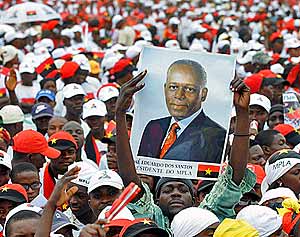17.09.2008
September 14, 2008 (the date of publication in Russian)
Ruslan Kostyuk
THE AFRICAN VERSION OF THE CHINESE WAY
Angola is recognized as the most rapidly developing economy
 The wave of Westernization, spreading across the Thirld World in late 1980s- early 1990s, reduced the number of single-party governments to a minimum. In most of countries of Africa and Asia, pluralistic elections and multi-party system became a common case. But every rule has an exception; one of them is the Republic of Angola.
The wave of Westernization, spreading across the Thirld World in late 1980s- early 1990s, reduced the number of single-party governments to a minimum. In most of countries of Africa and Asia, pluralistic elections and multi-party system became a common case. But every rule has an exception; one of them is the Republic of Angola.
In 1970-1980s, Angola was regarded as one of the major areas of instability on the continent. The civil war, breaking out after the collapse of the Portuguese colonial system (1975), involved a number of outside interests. The USSR, East European countries and Cuba provided comprehensive support to the revolutionary Popular Movement for Angolan Liberation (MPLA), while the United States, backing the oppositionist National Union for Full Liberation of Angola (UNITA), supported this party in accord with the officially "rogue" regime of South Africa. Meanwhile, China banked one more political force – the National Front of Angolan Liberation; this movement, however, left the political scene in mid-1980s. The civil war, with a great toll of casualties, lasted until late 1980s (the time of the collapse of the regime of apartheid in SAR).
During the civil war, the country was in fact divided into territories controlled by two major parties. Both sides officially organized elections, but political pluralism in war conditions was unattainable. The attempt of reconciliation, started in 1988, was supposed to reach peace between the two sides of warfare. At that tie, the new government of South Africa, the United States and Cuba signed an agreement, suggesting withdrawal of South African troops from Namibia and Angola; simultaneously, Cuba withdrew its contingent.
In May 1991 in Lisbon, one more basic agreement was signed by the two major parties – MPLA and UNITA, and civil peace seemed to arrive. However, the first pluralistic elections in 1992 divided the country again: while UN observers recognized the victory of the leftist MPLA, Jonas Sawimbi, chair of UNITA, claimed that the vote was rigged and refused to admit the defeat of his party.
USSR's disintegration made the further support of rightist guerillas unnecessary. Western corporations, interested in Angolan natural resource, preferred to deal with the stronger side, MPLA, and this cooperation was successful. The adjacent countries were similarly uninterested in UNITA's activity on their territories, and the guerilla facilities were consequently closed in South Africa, Namibia and Congo. UNITA went on organizing terrorist acts on government bodies and tries to capitalize from diamond smuggle. UN sanctions, imposed on "bloody diamonds" trade, eventually undermined the sources of UNITA's incomes, and after the assassination of Jonas Sawimbi in 2002 the movement ceased existence. A number of moderate UNITA members were pardoned and allowed to continue legal political activity.
The first pluralistic elections to the Angolan parliament were held only in this year. The leading political force, MPLA, gained the majority. This outcome was expected by international observers. Already in 1990s, the former revolutionary Marxist movement transformed into a social-democratic party and became a member of the Socialist International. Membership in the party has been essential for making a career in state authorities, including the military forces and the police. The official number of MPLA members exceeds one million.
MPLA has managed to retain its popularity not only due to the popular recognition of its role in the struggle for independence from Portuguese colonialism and from the racist regime of SAR. One more factor of the part's popularity is the stunning economic progress of today's Angola. In 2007, the economic growth comprised 24%. Though the statistics of poverty and unemployment are still high, as well as the child mortality rate, the government has managed to implement a number of crucial programs of social development, spawning a network of public schools and building a sewage system that reduced the traditionally high epidemic risks. Revenues from oil and diamond sales are spent also for the construction of fishing fleet, creating new jobs. Thus, MPLA plays the role of the nation's vanguard, mobilizing the nation for solving key economic and social problems.
In 1970s, Angolan revolutionaries were trying to follow the example of the USSR. Twenty years later, the attention of Angolans naturally shifted towards China, especially due to the obvious advantages of Deng Xiaoping's economic model. However, Angolans remember the assistance they once received from the Soviet Union – not only the vital financial support but also in comprehensive education and health care. A lot of Angolan specialists speak Russian and use the knowledge and skills once acquired in the USSR.
In his recent address to the members of Valdai Club, Russia's President Dmitry Medvedev acknowledged that Russia is going to re-establish relations with countries having a lengthy background of relationship with Moscow. Angola, the second largest economy in Africa, may become one of these new partners. In fact, cooperation with Russia is more natural for Angola than economic deals with former colonial powers like Britain and Portugal. I've heard this opinion from Angolan students, representing the new generation of the rising African economy.
Number of shows: 1142
 ENG
ENG 

 ENG
ENG 
